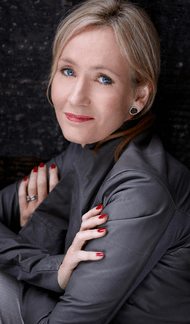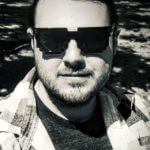Day one, everyone. Here is my first story about women in genre. J.K. Rowling’s name has been thrown in more than one conversation, because she has effectively shaped a whole generation and coincidentally, it was Rowling who got me into reading books for pleasure and taught me how to appreciate the written word. Rewind the tape, please.
As a kid of the 90s, I grew up with an unconditional love for my television set. Cartoon Network had invaded my life since I was six year old and has stayed there. Then came RTLII with German-dubbed anime and Fox Kids with the X-Men. Heaven had set up camp in my living room and I’d no intention to fall from grace any time soon.
 Books, at that time, perplexed me as they had no pictures, demanded attention and lacked fun the way I understood fun from animations. Plus, from what I’d seen in my mother’s personal library, books told stories about ordinary people in the real world. It didn’t help that teachers expected summer reading and reading journals with tens of questions about books I didn’t like at all.
Books, at that time, perplexed me as they had no pictures, demanded attention and lacked fun the way I understood fun from animations. Plus, from what I’d seen in my mother’s personal library, books told stories about ordinary people in the real world. It didn’t help that teachers expected summer reading and reading journals with tens of questions about books I didn’t like at all.
Where were the monsters? Where were the sorcerers? Where was the magic?
Here I have to give it to my mother who adores books and sought to introduce me to books properly. I clearly remember the afternoon she brought home “Harry Potter and the Philosopher’s Stone”. I had homework to do and the weather was gray, but I hadn’t yet turned on the lights so the beaten-up table swam in twilight when mother placed the book in front of me. I should mention that this happened during the years post the hyperinflation in Bulgaria in 1997 – the worst Bulgaria’s had, if I’m to believe what people have told me.
No one had money. Food prices skyrocketed and what was worse, food was pretty scarce. So for my mom to have bought a book, especially with my sister a toddler, now that was something really special. That’s parenting done right in my opinion.
In retrospect, I believe the experience of setting eyes on the cover resembled the sudden change from black and white to full color in The Wizard of Oz. Magic! Here is this dorky boy (Harry’s a bit of a spaz on that first cover) my age (I was right around 12 years old, when Harry was told he was a wizard) with a wand (I was crazy about magic items) and my name (although I am Haralambi, everyone calls me Harry). It’s so uncanny, I used to think Rowling had dreamt my life and got the inspiration from there.
I devoured the book the way a boy who has never read for pleasure could – in small chunks until words would swim and I had to take a break, but I absolutely loved the feeling. I still get that feeling, a bubble that fills up with emotion and overcomes me body and soul. Rowling’s worldbuilding allowed absolute freedom. Everything could be magical and it’s this freedom most cartoons about magic lacked as they relied on a small, focused concept reduced to a magic item with a strict number of skills.
My mind was blown. Blown, I tell you, but in a constructive manner, because I could see well beyond the limitations I had about creativity and imagination.
It also brought a lot more personal freedom as I was a shy kid and hated how crowded my house would grow when everyone would gather at the same time in one room. Sometimes, I had to go through hard negotiation talks to reach the TV set, but with a book, I only had to find a comfortable spot.
This is what J.K. Rowling gave me – imagination, freedom and a burning passion to find books with magic (I still had to learn that fantasy and science fiction were long, established traditions). It was the first time I ever felt I had something special and intimate going for me and for a sad (I think I carried a deep-rooted melancholia even then), introverted child, this realization kept me all warm inside.

Of course in the West we didn’t have the same problems with accessibility and cost of books (though I used to save up my pocket money just to buy books.) I can also relate the the introversion, and it was genre fiction that took me out of myself. My early influences were Robert Heinlein’s juveniles – what they now dub young adult fiction – and I soon moved to adult fiction, with Asimov, Clarke and the rest. In terms of women in genre, if you are talking specifically about science fiction and fantasy, my favourites are Connie Willis and Ursula K. LeGuin. Connie Willis is probably my number one pic, though. Others worth mentioning, of course are Octavia Butler, Joanna Russ, and Alice B. Sheldon. Sheldon wrote under the pseudonym James Tiptree Jnr, and her books were very special, and quite unique. Is your Women in Genre focussing exclusively on science fiction and fantasy? Because there are so many wonderful writers in crime, horror and slipstream fiction as well.
Every woman writing, editing and reviewing in genre, including horror, weird and slipstream. I even have superhero comics lined up at one point. It’s a place for all.
Great idea. Kudos to you, Harry. Here’s a book that opened my mind to the possibilities in the genre:
http://www.amazon.com/Women-Wonder-V41-Pamela-Sargent/dp/039471041X
Fantastic to hear there was this as a project that early on. I would like to get a hold of that book.
Some women whose work in SF/F has meant a lot to me:
– Diane Duane, whose views on religion have seriously influenced my own.
– Janet Kagan, writer of wonderful alien worlds.
– Patricia Wrede, who wrote the story I’d always wanted to read about princesses and dragons.
– Jo Clayton, one of the first to write a strong female protagonist without shying away from her sexuality.
– Ursula Vernon, trope-subverter supreme.
– C. S. Friedman, author of (IMO) the single greatest closing line in SF/F.
And that’s not even counting the household names — MZB, Lois McMaster Bujold, Anne McCaffrey, Mercedes Lackey, and today’s hottest rising star Seanan McGuire. There are many more who operate primarily in the realm of short stories, and whose work I therefore encounter mostly in theme anthologies.
Excuse my ignorance, can someone enlighten on what a trope-subverter is? I goggled it up and there were not enough information so I am assuming it is a relatively new term. Aside from this, great article, Haralambi! I confess that I don’t read many fantasy books as I am a hardcore science fiction and horror reader but my daughters already read Harry Potter books so I owe them by giving me a chance to read and find out why you and my daughters are so wrapped up in the series.
It basically means (the way I understand it) that the author takes a trope that has already been established and then does something completely different and fresh. It reclaims it and adds something new to it.
As far as Harry Potter goes, I don’t think they will make thrilling books for adults. I read them as a kid (12) and for that age group, I have to say the series is great as an introduction to fantasy.
Who are your favorite hardcore SF female authors?
Haralambi,
I want to thank you for the explanation of that term. For my favorite hardcore science fiction authors, I have not read that many but I would say it is Nancy Kress and Kristine Kathryn Rusch as I read their short stories in Asimov’s Science Fiction magazines. My name may implies that I am a female but I am really a male. I was exposed to mainly male hard SF authors’ works like Robert A. Heinlein, Larry Niven, and others. I have Doomsday by Connie Willis that I need to read soon.
[…] a day about a woman in genre who impacted his life (examples so far include but are not limited to J. K. Rowling, Ursula K. Le Guin, Rachel Vincent, and Theresa Lucas from Fantasy and SciFi Lovin’ Reviews). […]